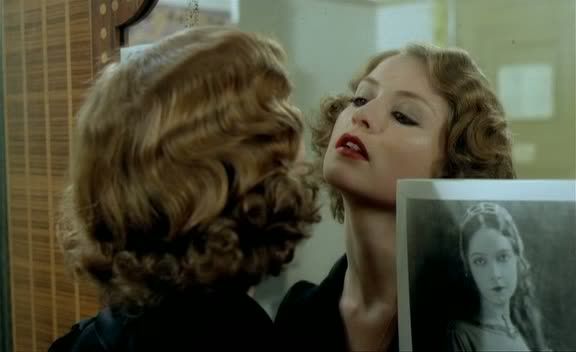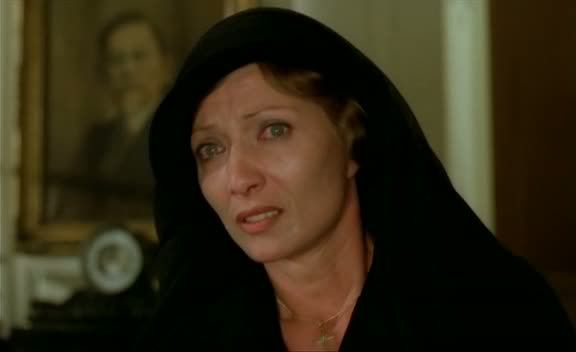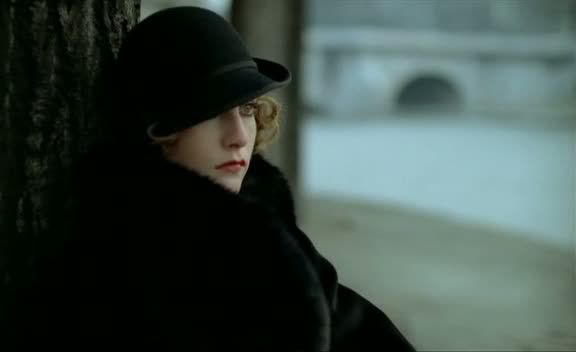

Claude Chabrol's Violette is a fascinating, ambiguous study of a young woman who might be a sociopath, a victim, or both. Based on the real case of Violette Nozière (Isabelle Huppert), who poisoned her parents in 1930s Paris, the film is curiously ambivalent about its titular anti-heroine. Huppert's Violette is impenetrable and deliberately contradictory. Sexy, desperate for attention and affection, disturbingly cool about her crimes and her violence, she's an intriguing character who's all but unknowable in the end. Violette is a willful girl who presents a charming, innocuous demeanor to her rather gullible parents, who buy her repeated and flimsy lies without much debate, while outside of the home she prostitutes herself — while vociferously resisting the label of a "whore" — and steals and lies habitually.
Violette switches between two very different looks throughout the film, embodying her contradictions in her appearance. At home with her parents, she wears no makeup and dresses in demure, youthful clothing. But once out of the view of her parents, she immediately puts on heavy makeup, coating her lips with bright red lipstick and painting her nails red as well. Her age is ambiguous, just like everything about her, since her childish clothes sometimes make her look like a little girl — albeit one with Huppert's already-world-weary face — while when she's made up she looks like she could be anywhere between twenty or thirty years old. The effect is especially disorienting when Chabrol cuts in flashbacks to Violette's childhood in which Huppert is made to look even younger, the effect somewhat disturbing and disorienting, a grown woman playing a child, as though even as a girl she was older than her age.
Outside the house, Violette dresses all in black, with a very distinctive look, a hat perched at an angle atop her curls, often all but obscuring her eyes so that only the red smirk of her mouth peeks out from beneath the shadowy brim. With her black furs wrapped tightly around her, her collar high around her face, she's often reduced to a few cartoonish features: the black-rimmed eyes, the bright lips, the rouged cheeks, a caricature of threatening beauty, the ultimate femme fatale, her sexiness infused with a sense of danger and darkness.


She's like a black widow, but there's also a sense of vulnerability in her, a closely guarded secret hurt. She accuses her father (Jean Carmet) of abusing her, but Chabrol makes it very ambiguous whether Violette was lying or not. In Violette's flashbacks, she remembers strange scenes from her youth that suggest her disconnection from her parents, and in one of these flashbacks her father is bouncing her on his knee, an innocent fatherly gesture made sinister by Violette's accusations. There does seem to be more than a hint of inappropriate desire between father and daughter, especially when he watches her bathing herself topless in the bathroom, just a thin, gauzy curtain separating them and failing to obscure her body from the eyes of her father. This incestual subtext is counterbalanced by some seemingly idyllic flashbacks to Violette's childhood, in which she fondly remembers her father as a shouting, waving figure flying by on the locomotive he drives, yelling out her name as he passes, his face stained with grease. At what point did Violette's life go wrong, at what point did this sweet girl, so excited to see her father, become the chilly, money-obsessed monster she is when she's older? By having Huppert play Violette even in these childhood flashbacks, rather than substituting a child actress, Chabrol adds a weird, unsettling vibe to the girl's memories that suggests something dark lurking unseen in her past.
Other than these hints and insinuations, however, Violette mostly just seems like an ordinary young girl with an ordinarily overbearing family. Her father is clueless and dotes on her, while her mother (Stéphane Audran) snoops through Violette's things and treats her with cynical suspicion. Violette is also involved with the handsome young Jean (Jean-François Garreaud), who she clings to desperately as her ideal man for undefined reasons, even though all he does is pump her for money and skips out on her at any opportunity. Violette seems desperate for affection, desperate for some kind of life outside her home and her family, and despite her superficially cool demeanor she's very clingy with the distant, obviously manipulative Jean.
Chabrol is gradually building towards the especially unsettling conclusion, which does little to clear up Violette's character, while setting her alongside a prison cell mate played by Bernadette Lafont, who'd been the sexy bad girl at the center of some of Chabrol's earliest films. The film's final narration, recounting Violette's eventual redemption, accompanies a shot of the girl staring blankly back at the camera, as though daring the viewers to judge her, to try to understand her, to probe the darkness and strangeness lurking behind those glassy, black-rimmed eyes.

3 comments:
One of Chabrol's very very best. Huppert starts here, with an incrediblt detailed and delicate performance. Violette's relatioship to her parents is mind-boggingly ambiguous -- particularly her mother as played by the great Stephane Audran.
It should be noted that the real,Violette became a major anti-heroine to the surrelaists.
Yeah Huppert is amazing here, especially since, as you say, so much about her character, her motivations, her relationships, is left purposefully ambiguous by Chabrol. It's a fascinating, unsettling film and performance.
your your article is simply superb you say the character was really nice
Post a Comment